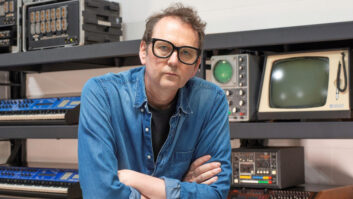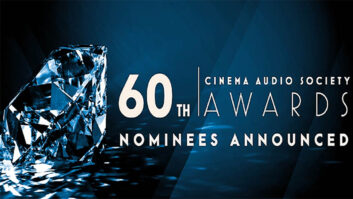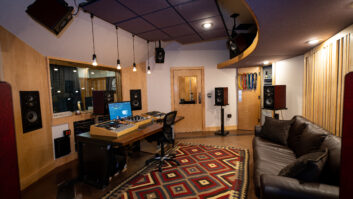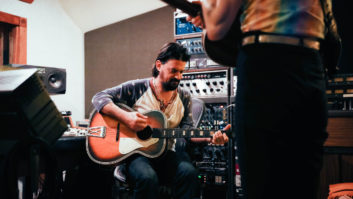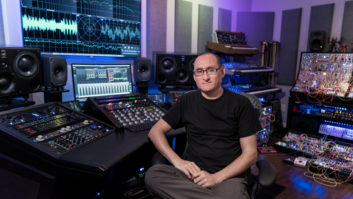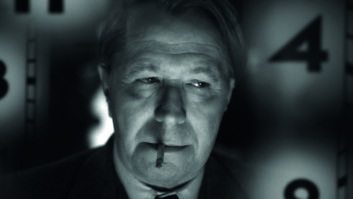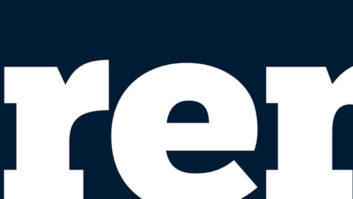It’s truly a rare thing in these times to watch a musician mature. The velocity at which most pop acts are cultivated, marketed and forgotten seems to work off an exponential graph that would appear almost vertical to all but those who created it. Trent Reznor, whose career barely touches the 15-year mark, has managed to make the quantum leap from Rolling Stone-cover-hype to seasoned professional. He’s maintained a youthful authenticity in the eyes of his devoted fan base, while also exhibiting the kind of cautious and calculating resolve that so many of his now-forgotten contemporaries lacked.
It’s difficult to know what to expect when meeting Reznor for the first time. It’s easy to conjure up images of a mad man, smashing keyboards with his mic stand and sending his bandmates to the ER. It’s true that some of his on-tour indiscretions have ascended to the upper-echelons of rock’s sleaziest moments. But upon entering the Manhattan hotel room of Mr. Self-Destruct himself, I certainly wasn’t confronted with the expected array of cocaine, tequila and strippers with cell phones. In fact, his modest Midtown suite was barren and unscathed, with the exception of a glowing laptop and the reassuring glow of his omnipresent publicist, Susan.
As I sat down, Reznor strolled in, unshaved and a bit weary from a long day of press, yet his responses seemed extremely candid, his infamously dark wit was in top form and he seemed to be in good spirits. The last, of course, was the most surprising: Inside of the past three years, he’s written and co-produced The Fragile (easily among the most eagerly anticipated rock albums of the past decade), embarked on an extensive world tour, and managed to survive in a musical climate that is, to say the least, artistically stifling.
Now, Reznor is focusing his efforts on the people who really matter to him — his fans and himself. For his fans, this month, he’s delivering a long-awaited live DVD/CD that he hopes will put the bootleggers out of business and set a new high-water mark for production values and ambition. For himself, he’s re-honed his skills as an engineer, embracing the new frontier of surround sound. The man who helped make samplers and sound cards seem cool to the youth of the world isn’t content to allow mediocrity to reign supreme.
All right, so take us though the past few months. I assume you nixed the lengthy vacation in the French Riviera and got back to the studio?
We didn’t take much of a break. Toward the beginning of the tour, once it started getting up to speed, we had the idea that it would be cool to do a live DVD, and probably a live album. So that started the procedure of thinking, “Well, what would be the primary focus of it?” And I thought that I was very pleased with the way the live show had gone and proud to present it every night. I thought it would be nice to have some kind of document on that. Not what goes on backstage, and not the crowd talking; not the typical live thing. Just about the show itself.
I had used a film company to do the Spiral tour one time, and they did just a shitty job. They did a good job, just not the right job. [There were] crane camera shots, and everything was lit up too much, and we looked terrible. We looked like a different band. I was ready to quit music when I saw the footage.
So on this tour, I had this attitude of why can’t we just do it ourselves? Final Cut Pro had just come out on Macintosh. So I thought, let’s film it and then see what we can do. It wasn’t much of an expenditure — just a few digital video cameras and tape. And then we went out and did a mobile/location recording on, I think, five nights.
And how were you doing that? Did you bring your own rig?
We used Effanel, and it all went to digital multitrack.
So they just laid down dry tracks, pre-board?
Yeah, and I set up different sets of stereo crowd mics. Every time I’ve done a live recording, the live mics, the room mics, are shitty. Somebody didn’t think, and then you’re spending your whole time trying to simulate it with reverb and stuff. So I said just get at least three stereo pairs of different mics throughout the space — close, medium and far — which still sounded shitty for the most part, but some of them were better in the different rooms we were in.
So we end the tour. We get all this footage, approximately eight cameras per show, so figure about 20 songs, eight cameras, 25 shows…lots of tape. And with a little bit more research on the video side of things, we found out that we could do it all on a G4 with a bunch of FireWire drives hooked up to it. And there were two guys that were involved in it: myself and Rob Sheridan, who is our Web designer, a 21-year-old kid, who wants to work on stuff and is excited about it.
And you guys just sat down in the studio and got to it?
We just dumped the stuff in and started trying with one song to see if it will even work. Can we get 30 tracks of video playing at once off the FireWire drives? At that point, no one could answer that question. Yes is the answer. Surprisingly. So for a pretty modest sum of money, we had a gigantic amount of footage digitized and ready to roll online.
From there, it was trial and error, figuring out the best way to do video. We decided that we would obviously cut the video to an audio track. So we picked the best take per song from the nights we had recorded and started work in tandem. And we went in with the band and fixed some things, but kept most of it. Having a great drummer is a lot easier than having a shitty one, I discovered. I didn’t have to change anything on that. And I tried to go at it with the attitude of not turning it into a studio album that just has crowd tracks that don’t line up with the new audio.
We also decided that we were going to mix in 5.1. And after a lot of fact-finding, [we asked ourselves] do we want to take the tracks to a studio that was set up to do that, or do we want to attempt to incorporate that into our studio? It seemed that the amount of money it would take to do that in our own studio would be worth it, versus going somewhere that was already set up to do it. And we had [engineer] Ed Cherney — he’s a friend of ours — come up. Because he’s mixed some DVD live stuff, we had him run us through, for example, what the f — do you put in the center channel? It seemed to be that no one had a clear answer on what is in the subwoofer. I mean, do you mix for that? Does it roll it off itself and put it down there? You know, those kind of things. What not to do.
So after talking to people who had some experience mixing in surround, what was your approach?
Well, it’s a live concert. Do we want to put the guitars over your head or do we want to not take away from the impact of watching the live show? One of my complaints in listening to [other people’s] surround mixes is that the impact of the loud stereo mix was gone, and I don’t know why that was. I don’t know if it is the sonic inadequacies of Dolby Digital 5.1 versus DTS. I don’t know if people don’t know what to put in the middle speaker. I don’t know if it is everyone is so concerned about putting it around you that it loses its direction and impact.
So our number one rule was we wanted this to seem like you’re watching a live concert, so you’re going to hear space around you. And, most importantly, it kicks you in the ass. It’s gonna punch you in the face. There’s a good punch to it. It doesn’t lose its focus because we’re obsessed with using that center speaker or whatever it is. So that kind of approach and that rule was set in stone, which I agree is not the most radical or experimental thing. For this, we thought what makes the most sense was to be punchy and direct, like you’re watching the band and you’re immersed, rather than allowing the rear speakers to be distracting and irritating.
Now you’ve done this big revamp on the studio. What does that entail?
Well, we made it surroundable. I justified buying a new Lexicon 960 because, you know, it’s fun to do. [Joking] “You gotta have surround reverb if we’re gonna do this.” And in the budget, I guess we can just slide the other $15 grand in there somewhere. It’s interesting; I’ve seen some DVD-Audio things come out. Missy Elliot has one that is actually kind of interesting. It’s made me also aware of how limiting and outdated DVD is already. And it’s frustrating.
How so?
You know, sometimes when you’re listening to this DAT machine versus that machine, back and forth, and this A-to-D converter versus that one, and you’re going back and forth, and in abstract terms, one is more present and clear…When we would switch between DTS and 5.1, it was like, “Did we do something wrong?” It literally was an amazing, obvious difference. Not subtle — a pretty big difference. So, we decided we wanted to put DTS and Dolby options on there. And I think when you see a movie [on DVD], you get French, English, German, blah, blah, blah, 5.1, 4.1, who knows what. But I wasn’t aware of all the limitations. As we started to get the DVD authored, to have video and both multitrack audio formats, your video gets all f — up because they have to reduce. I wasn’t aware that there is only so much information that can come off of the disc at once.
Then I found out about video compression. I thought it was like audio compression, where it just throws away what it doesn’t need or what it thinks you don’t need. But as I understand it, with video compression, let’s say there’s this shot of us talking in this room for five minutes, the background can get compressed because it’s not changing. So it’s looking forward and backward in time, as opposed to audio. Now, imagine a shot where [there’s] a strobe light and the camera is panning constantly; it can’t compress it because it doesn’t have the luxury of a static background. So the guy was saying this is your worst kind of information for video compression, our whole live show because there’s no constants there. So I can’t compress the video down without it looking like a Quicktime [file]. So we had to make the decision to put just Dolby on one version of the DVD and just DTS on another version. Now, the consumer has to be smart enough to know [to ask], “What do I have?”
And I’m thinking if I’m already hitting a wall right now, shouldn’t someone maybe have thought that there should be more information coming through the pipes, or made the format better?
Away from the DVD, what else are you working on?
The last few months, I’ve been working on a lot of new material for Nine Inch Nails. I was gonna go in and do an album real fast, and did a bunch of music. And then I started wondering if it was the right direction to go ’cause I wanted to make sure that I was in the right frame of mind, and it wasn’t just a reaction to other external things. So I kicked in to finishing this, what I’m working on now. Currently, the most interesting portion of it is the CD format — instead of it just being the audio from the DVD, there’s a companion disc that comes out with it — instrumental stuff and weird leftover, broken-down versions of some of my favorite songs that didn’t make it on the live album. And that’s got like five new tracks on it; it’s been interesting to work on. It’s the soundtrack for a rainy Sunday afternoon, which is a nice counterpoint.
What’s the sort of thumbnail you have for the next version of Nine Inch Nails at the moment?
At the moment, and I’m sure this will change, it’s a fraction of the amount of tracks of information, and it’s more kind of low-fi, kind of dark and brutal. A lot of musical tracks I’ve worked on have been kind of old Public Image Ltd. — kind of brutal, tribal beats, just minimal stuff going on. And lots of my new, expensive reverb. [Laughs.] ‘Cause I’ve got one, and I’m gonna use it on every goddamn track.
In the past few years, there has been this well-documented explosion in home studio technology and kids buying stuff. Do you feel any responsibility for that? I mean, perhaps the popularity you’ve enjoyed has helped to change a generation of musicians.
I’d love to think I had a hand in it, and I think that since the gear is so affordable now and available to anyone for the most part, I think that that’s a great, great thing. And anyone that fears that are usually bloated studio owners or people that didn’t want that technology to get down to that level. The same thing is happening now in the video movie-making world, with iMovie and everything else. And now anybody with an iMac can dump their camera in and make something interesting. It puts creativity down to, you know, street level, which doesn’t mean that all good stuff is going to come out of it. But it is interesting to know that the tools are now available.
On the flip-side, do you feel any sort of new sense of competition? You know, “I better stay as current as possible, because there’s this whole group of kids behind me.”
No, I’m not worried about that because…we were sitting around the other day talking about this. I’ve got an old PPG Wave just because when I was growing up, that was the $30,000 super Fairlight: “Oh my god, if I only had one of those, I could…” And when I saw it — green, giant display — I thought, “Yeah, I’ve gotta have that!” And then I was just looking at the VST plug-in, and it’s better. Now the sound is better, it’s reliable and it works, unlike the one I had. And it was like, “Kids these days. If they knew what we had to go through to get…” You know, with Acid and things, everything’s in time and elaborate. Like, I was just blown away with Absynthe. It was just amazing. And it’s intuitive, and I wish I had that 10 years ago. But it’s all jokingly looked at because I’ve always felt like I’ve had enough confidence in myself, and I’m just utilizing the tools I have around me to come up with good ideas. I’ve had people ask, “Aren’t you worried about your sounds?” I said, “Take my sounds, because I’ve used them.” If my success was based on the drum sound on “March of the Pigs,” then it’s time to hang it up.
Do you ever think, “I’m gonna run in a room with a keyboard and a mic and a 4-track, and screw it all?”
I have had that thought, and I usually get that thought when it is time to really begin a new phase of writing. I feel that a lot of times, I know what tricks work, and I know my way of doing things, and sometimes I’ll feel, aren’t you just doing the same thing ’cause you know how to do it? And I know it’ll get this result. Or, what if I just went in with a guitar and no computer? That usually lasts about 10 minutes until, [singing] “I bought my love a …” [Laughs.] And that can be my own weakness, but it’s also…the computer to me is just like a pencil and paper. It’s a tool that I’ve used. I think sometimes of changing sequencers or limiting myself to different things. The problem in the studio that I have right now is I have too much stuff. Anything that I need is there, and sometimes I don’t need those things.
With regard to the industry and the biz, how have you seen your position evolve over the past 10 to 15 years? Is it ideally what you want? What don’t you like about it?
I can’t complain. I feel very fortunate to have wound up where I am right now. And it’s been a learning process through the whole thing. I thought I kind of knew what I wanted to do when we started out, and then the door started opening and you’re constantly faced with decisions to make that, a lot of times, are tainted by external things that aren’t the best things for you, like money and fame, and you get a taste of it and it was nice. I can bitch about being on the other side of that velvet rope, but the time you got let in, you know, “It’s not so bad in here.” So if I do more stuff like this, I can be on this side all the time and I can now have things. I can live in big houses and have cars, and people like me because I have money, I think. Just crazy shit just starts to get in there. And I think I made the right decision. I’ve had to check myself a few times, but tried to stay on the path and really remember why I’m doing this, which is not to make money. But, because music is what I do, what I love, it’s my passion, my art and I’m thankful that I can make money doing it.
But I think in the recent few years, seeing my dream or my interest move…I’d prefer to be Brian Eno instead of Iggy Pop. And I found my tastes changing in terms of just what I need to make me feel better as a person and when I can focus creativity and what parts of this I don’t like. I hate the nature of the business right now. I think that it’s a very stifling, uncreative, non-artistic, non-musical climate right now. Where the lines between art and commerce dissolved into, “I’m just giving product to a label that will make all the money and discard me when I’m not viable anymore. That’s it!” Yeah, I know I’m selling a record to people, but it’s not laundry detergent. This is art, this is something that is precious and it should be respected as such. “Um, no, I don’t want a commercial on this terrible TV show when you get a free sticker if you buy your record after 2 p.m.” F — that.
But now, record labels have turned into three big companies, and their pipeline for putting stuff out is only so big. And there are 75 Britney Spears going right through it like diarrhea, and then there is the square peg in the round hole that’s fighting every inch of the way about things that don’t matter like your artwork or….
Do you think that a generation of kids is being robbed?
I think that most people will like what they’re told to like to a degree, but unfortunately, now it seems like there is less stuff that has integrity, or the art side of things is being underplayed. I don’t think record labels, for the most part, care about music. They just want to make money, period. I know that’s the job. I know that’s the end result everyone’s hoping for. But it seems like there are fewer Chris Blackwells and there are fewer Danda Millers, there are fewer Seymour Steins, and there are fewer people that love music in top power positions. There are more corporate yes-men and guys whose job it is to meet that bottom line. And it’s made for a very stifling climate.
For bands like you guys or, for instance, Tool or Radiohead, has playing live become the only viable way to promote your work?
Well, MTV’s not an option for the most part. Radio…I don’t know what they play ’cause I don’t listen to it. When I did turn it on, I heard a Fred Durst-related project the last several times I’ve been in someone’s car, so that’s not an option. [And that leaves] playing live or just hiding in the studio. I mean, playing live is always going to be there, ’cause it’s an important thing. And the funny thing I realized, which I didn’t realize how obvious it was, is a tour is just to sell a record until it breaks even. That’s a successful tour. Maybe it’s time to shift that around. It’s a weird business; it can beat you down, it has beaten me down in the past. But it is always a matter of re-focusing yourself as an artist and remembering why you’re doing this.
Okay, last question, if you could create an ideal situation for yourself, what would it entail?
If I could change the world right now, applying it to the fairly unimportant world of the music industry, what with everything that’s gone down recently, I would hope that in the near future, there would be an awareness that people are sick of junk food, and that they would like something that they can think about. And it may be that there would be some crumbling of these giant megalotropic giant corporations, including venues, radio stations, record labels. And possibly that artists can be recognized for what they are. And as much as I have my problems with Courtney Love, I applaud her attacking the contractual side of the indentured servitude of these musicians. It’s not just rock stars bitching about not making more money. I would hope that there would be a new sprouting up of new record labels, possibly Internet-based distribution or some climate where musicians would be encouraged to be creative, not punished for it. I would love to be involved in that.
Robert Hanson, Mix’s assistant editor, saw Nine Inch Nails for the first time on September 30, 1994. He purchased Master Tracks Pro for his Macintosh LE a month later, and things haven’t been the same since.
